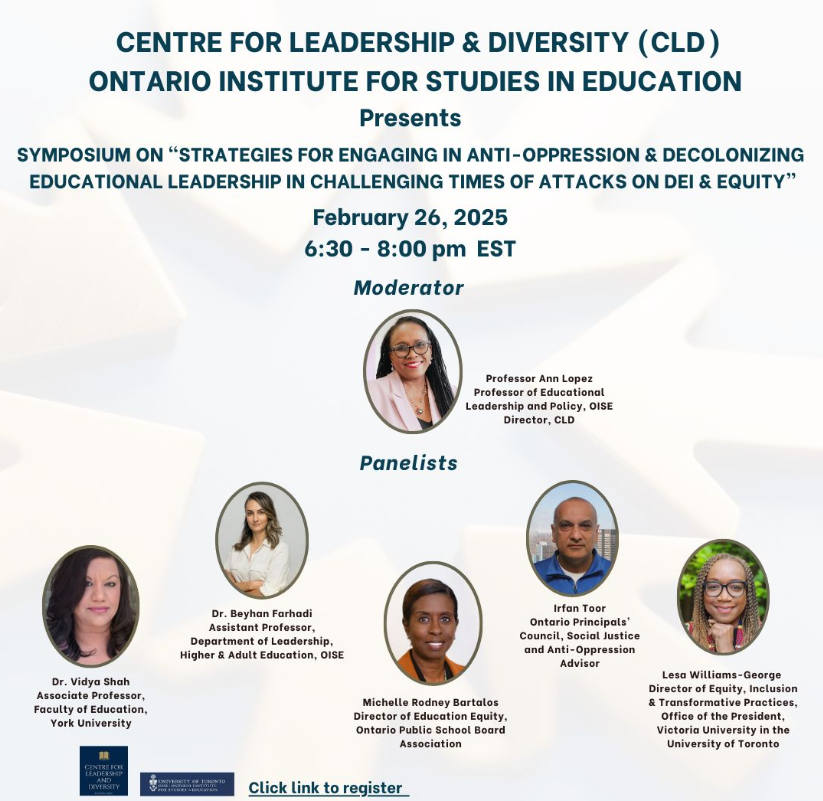CLD Symposium Focuses on Strategies for Engaging in Anti-Oppression & Decolonizing Educational Leadership in Challenging Times

On February 26, 2025, the OISE Centre for Leadership and Diversity hosted a virtual symposium titled "Strategies for Engaging in Anti-Oppression & Decolonizing Educational Leadership in Challenging Times of Attacks on DEI and Equity." Over 120 participants—educators, students, and community members from K-12 schools, post-secondary institutions, and other educational organizations—attended this vital event.
The symposium, expertly moderated by Dr. Ann Lopez, provided a rich platform for dialogue and the sharing of experiences. Distinguished panelists—Dr. Beyhan Farhadi, Dr. Vidya Shaw, Michelle Rodney Batalos, Irfan Toor, and Lesa Williams-George—brought diverse perspectives from various educational contexts. Their contributions highlighted the multifaceted challenges and opportunities inherent in equity work within contemporary educational settings.
The focus of the symposium revolved around practical strategies for creating more equitable education systems and schools. Panelists explored various key themes, fostering insightful discussions that were enriched by the thought-provoking questions and suggestions from attendees. Several key strategies and considerations emerged from the discussions:
- Defining and Articulating DEI: The symposium addressed the crucial need to clearly articulate what Diversity, Equity, and Inclusion (DEI) means and its benefits for all students. As Ladson-Billings argued, effective DEI is, at its core, "good teaching." However, it goes beyond that, aiming to change oppressive systems.
- Evaluating DEI Effectiveness: Participants engaged in critical self-reflection, questioning whether DEI initiatives are achieving their intended goals and addressing existing systemic inequities. This involved examining the specific goals of DEI work and evaluating its success in achieving those goals.
- Centering and Human Rights: A recurring theme emphasized the importance of considering who and what is being centered in DEI efforts. The discussion extended beyond single-issue approaches, recognizing the interconnectedness of human rights and the necessity of a broader, more holistic perspective.
- Land, Resources, and Grief: The symposium critically examined the role of land, resources, and the inherent bounty of the earth within the framework of DEI in education. It highlighted the need to acknowledge and engage with the historical and ongoing impacts of colonialism and injustice, incorporating grief as a crucial element of justice work.
- Future-Oriented Strategies: The conversations also explored envisioning new futures and the importance of intentionality in DEI initiatives. Recognizing that individuals and communities may resist change, the symposium emphasized the need for educators to understand relevant policies and data effectively. It also stressed the crucial role of building relationships across diverse perspectives.
The symposium offered a powerful space for critical reflection, practical strategy sharing, and collaborative learning within the context of DEI. By focusing on concrete strategies, self-reflection, and future-oriented planning, the event contributed significantly to the ongoing conversation surrounding anti-oppression and decolonization within education. The discussions sparked by this symposium promise to influence ongoing efforts toward creating truly equitable educational environments.